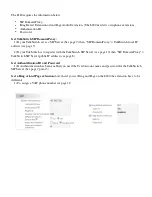
15
4.2 SIP Extensions
This page allows specification of the SIP signalling stack behavior under certain scenarios. If you
wish for the SIP stack to implement reliable transmission of provisional responses according to
RFC 3262 (using the PRACK method), check the option “Support PRACK method with
provisional response reliability”.
If you wish for the SIP stack to include the user parameter “user=phone” in the SIP URI
header(s), check the option “Encode SIP URI with user parameter”.
If you wish for the SIP stack to send INVITE messages with the “Timer” header field present,
check the option “Send INVITE with Timer header value” and enter the Timer header value. If
you wish for the SIP stack to implement a session timer according to “draft-sip-session-timer”,
select the option “SIP Session Timer value”, and enter the session time-out value.
Press “Save SIP Extension Settings” to save the new values.
4.3 Out-of-band (OOB) Signaling Settings
This sub-page allows configuration of the out-of-band signaling options for SIP. Select whether
OOB telephone event signaling is to be done using the SIP INFO message, or to be done via
RFC2833 RTP signaling.
4.4 SIP ToS/DiffServ Settings
This sub-page is used to configure the Type-of-Service/Diffserv byte values which are to be used
in the IP header of all transmitted SIP signaling packets and RTP packets. The ToS/DiffServ byte
values are entered as two-digit hexadecimal values. If no special ToS/DiffServ value is to be used
for a particular traffic type, enter “00” or leave the setting empty.

























